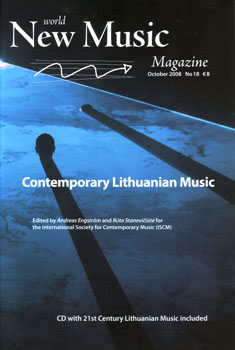Lithuanian contemporary music has a complicated and even paradoxical history. In the course of the 20th century, a continuing search for the national interacted with the modern, both within musical practices and musicological discourses. It is obvious that in Lithuania musical nationalism unfolds as a sub-discourse of modernistic ideology and, vice versa, modernism is employed to define national identity through the means of music.
This search for an expression of national identity in music and a continuous modernisation of musical tradition is to be seen in the light of the political history of Lithuania in the 20th century. The Soviet occupation (1940-1941 and 1945-1990), the political regime, and ideological and cultural censorship during the Soviet years certainly affected political and cultural opposition. The attributes of the national and modern in music were used for stressing the cultural resistance and uniqueness of a national tradition. Such orientation and values influenced the development of 20th-century Lithuanian music up to the restoration of independence of Lithuania in 1990.
The course of Lithuanian music culture during the 20th century and its current state could be described in terms of interruptions and fragmentation. The variety of artistic orientation of the interwar period alongside postwar aspirations emerged as a response to the challenges of the Western musical avant-gardes and modernisms. But many creative inventions had no continuity due to extra-musical factors. Soviet occupation ended the dissemination of the modern innovations of interwar Lithuanian composers, and the founders of the Lithuanian section of ISCM of 1937 found themselves in exile. Nonetheless, local experimentations in the field of electronic music and performance art emerged spontaneously on the margins of musical mainstreams from the 1960s to 1980s. Any putative institutionalisation of new music in society faced even stronger challenges and limitations: truly international festivals of contemporary music started to be organized only in post-Soviet years.
The quest for a cultural identity of Lithuanian music was further integrated with its international dissemination and reception after restoration of independence. In the context of globalisation, such a tendency was also in response to an urge to bring emblematic names of contemporary music to Lithuania, as a strategy of placing Lithuania in a contemporary international context. What best characterises Lithuanian music? Is there a genuine Lithuanian sound? These questions have become important for music critics, programmers and promoters since the 1990s. Undoubtedly, there is no single answer to this question.
Although there were plans to arrange the ISCM World Music Days in Vilnius as early as in 1940, it is now in 2008 that the festival for the first time takes place in Lithuania. This issue of the World New Music Magazine is therefore devoted to Lithuanian contemporary music. This context therefore formed the point of departure for a selection of texts, which concentrates on the representation of different perspectives on the formation of Lithuanian new music tradition and its currents. Some selected issues – the expression of cultural identity, Lithuanian versions of modernity, the formation of a contemporary music scene, past and present alterations of tradition, reception of Lithuanian music – are tackled from internal and external perspectives as well as from positions held by composers, critics, performers, organizers and promoters. We hope that this selection of texts will foster further discussion on Lithuanian music and related issues in other musical cultures.
Andreas Engström
editor of the World New Music Magazine
Rūta Stanevičiūtė
guest editor / co-editor of this issue of World New Music Magazine

